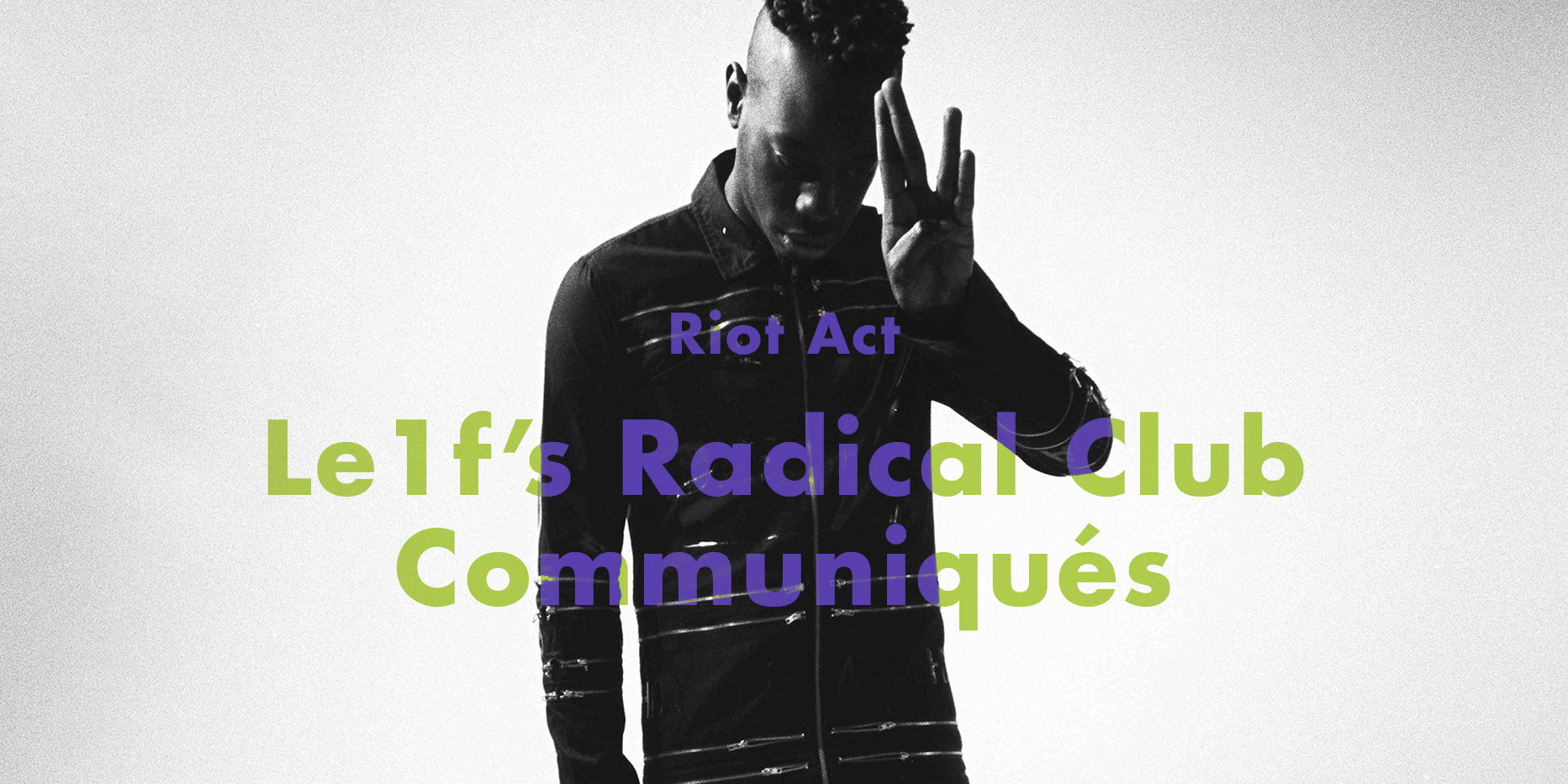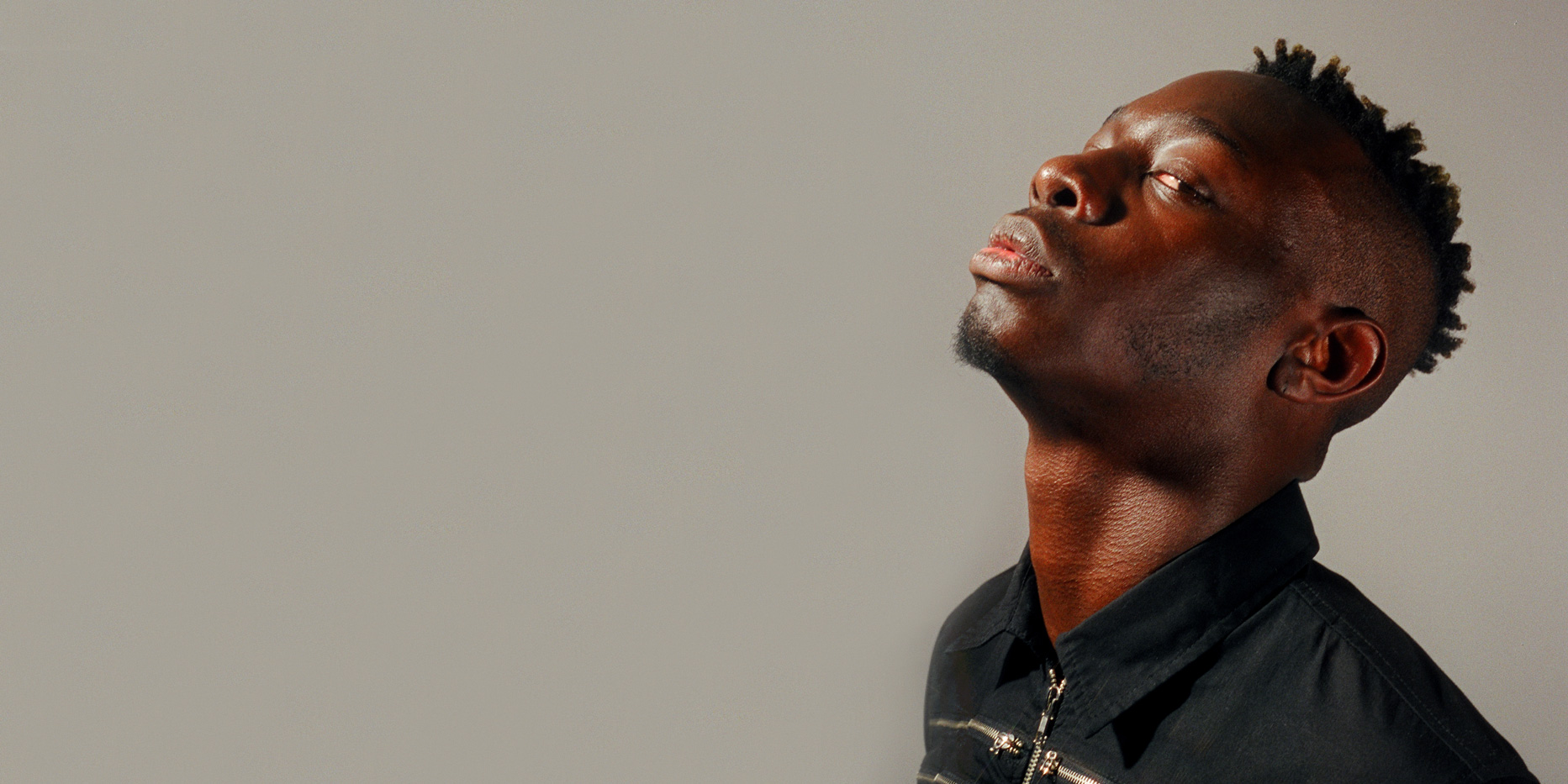

Le1f is sitting across from me at a picnic table in front of the Shrine, a restaurant and world music venue a dozen or so blocks from his apartment in Harlem. He’s in a form-fitting camouflage sweater with pink Chinatown sunglasses hanging from his neck, earnestly describing how he wants to punch a hole through the wall of music for himself and others like him: artists who don’t hesitate to weave political and social commentary into their work.
“If people can make records that are about cars, drugs, women, and money, and that makes sense, then I can make songs that are about misogyny, misandry, homosexuality, transphobia, Black Lives Matter, and all that should makes sense, too,” says the 26-year-old. “I want to be part of that wave of people that is more responsible, you know?”
Following a triptych of fractured, weed-cloudedmixtapes—“experiments,” he calls them now—this new objective comes through with force on Le1f’s upcoming debut album, Riot Boi, a breakneck set of murky club songs that double as transglobal surveys of everything from clean water availability to internalized homophobia to cultural erasure. Each topic is sieved through the Manhattan rapper’s raspy, elastic flow and a spread of icy production from the likes of Lunice, Evian Christ, and Blood Diamonds. It’s a dark and restive record, assessing the blights of our society amid spitfire boasts and woozy, ruptured backdrops. Though the glossy, #unbothered SOPHIE collaboration “Koi” serves as the album’s lead single, Le1f himself described it as “misleading” on Twitter—“a cute pink button on a heavy black cape.”
Set for release on Terrible/XL, Riot Boi’s activistic quality makes it a debut in the vein of other sociopolitical, club-ready communiqués, particularly those from XL alumni M.I.A. and Dizzee Rascal, two cultural and critical firebrands who Le1f is quick to cite as influences. M.I.A.’s 2005 debut Arular, with its globally-aware declarations couched in big, sticky hooks and experimental production, was especially resonant on Riot Boi’s melange of message and style. On “Taxi”, Le1f turns observations of casual racism into a clever chorus: “Boys pass me like taxis do/ I don’t care, whatever, it’s cool/ Roll the window up on ‘em.” And later, on the anthemic, Devonté Hynes-featuring closer “Change”, the rapper aims to disrupt millennial malaise on a grand scale: “My generation needs to come up, 'cause it’s out of order.”
“There literally is no one aside from M.I.A. who’s making entire records that are both pushing politics lyrically and with production,” he says. “I feel like it probably turns out that way because she’s a woman.”
The enormous influence of women on Le1f’s life and art functions as another key theme throughout the album: He recruits perennially underrated MCs Junglepussy and House of LaDosha on power-minded interracial sex romp “Swirl”; name-checks paradigm-defying fashion models Alek Wek, Grace Bol, and Naomi Campbell for a celebration of dark-skinned complexion on “Grace, Alek or Naomi”; and sings the praises of trans women on “Umami/Water”, which was inspired by NYC DJ, trans icon, and close friend Juliana Huxtable.
Meanwhile, “Change” even features Le1f’s opera-trained mother in a rousing closing passage. He owes her presence on the record to the pair’s close-knit relationship. (“I do it for my people and I do it for fun/ Then I do it for the money ‘cause it’s me and my mom,” he raps on “Hi”.) Though she has performed at major NYC institutions like Carnegie Hall, recording with her son took some adjustments. Says Le1f: “She’s used to having to fill up a huge room with her voice, so I was like, you can’t go that hard.”
Even with all of its loaded missives, Riot Boi is still a project by the same guy who got his start producing the quasi-joke track that put Das Racist on the map back in 2008; who gleefully plops soundbites from video games and anime into his rapid-fire verses; who rapped in the lap of a dude in a Pikachu mask in the video for 2012’s “Wut”, which has tallied more than three million views on YouTube; who brought along a pair of Hood By Air-clad henchmen as synchronized backup dancers for his late-night TV debut on “Letterman” last spring (a performance that Rosie Perez went on to passionately champion on “The View” a few months later). Which is all to say that Le1f is taking society to task on Riot Boi, but he isn’t about to relinquish his club roots in the process. He sums up the album’s politicized ethos with an inimitable, animated laugh: “Overall, every song has something that Desmond Tutu probably has listed on his Wikipedia.”

“How do you say things that most people don’t care to hear about in music—and how do you say it in a way that they might sing along to?”
—Le1f
Pitchfork: Who do you think is doing a good job of bringing politics into music at the moment?
Le1f: Mostly XL artists, and that’s why it was a big deal for me [to sign with them]. Also, Mykki Blanco operates in a similar mode. I guess Rihanna’s trying it. And there’s Kanye West’s Yeezus—I mean, the fact that he figured out how to complain on a beat and make it, like, poppin’. There’s definitely an element of that on my album. The worlds of Arular and Yeezus very much influenced Riot Boi.
Pitchfork: Is this album sonically different from your previous work because it’s so political? Did those aspects inform each other?
L: I think I just had to become a better vocalist. I have this theory that you can say whatever you want on a song if you say it the right way, so that’s what I’ve been trying to practice. How do you say things that most people don’t care to hear about in music—and how do you say it in a way that they might sing along to? Like, with [M.I.A.’s] “Paper Planes”, I bet there’s some people who will argue against immigration but also totally dance to that song in the club. I want to get to those people.
This album took me a super long time to make because I wanted to really tailor the songwriting. I made [2013 mixtape] Fly Zone in two and a half weeks, and although a lot of cool things happen when you move that quickly, the process of editing is really important too. With Riot Boi, I wanted every bar and hook to be worth it to me, and not something I’ve already done.
Pitchfork: What do you want people to come away knowing about you and your art after listening to Riot Boi?
L: That it’s about my art, and the music, emotions, and progress tied to it. After being poor and underground for so long and then making a splash and going viral with “Wut” and playing shows where I have all this weird lo-fi music but everyone’s waiting for me to play the one big song—I just want it to be about the music. It’s always been that way, but now I’m learning what that means and how to execute it. How to not just make music that satisfies myself, but also simultaneously make songs that will affect how people listen to music and exist in the world.